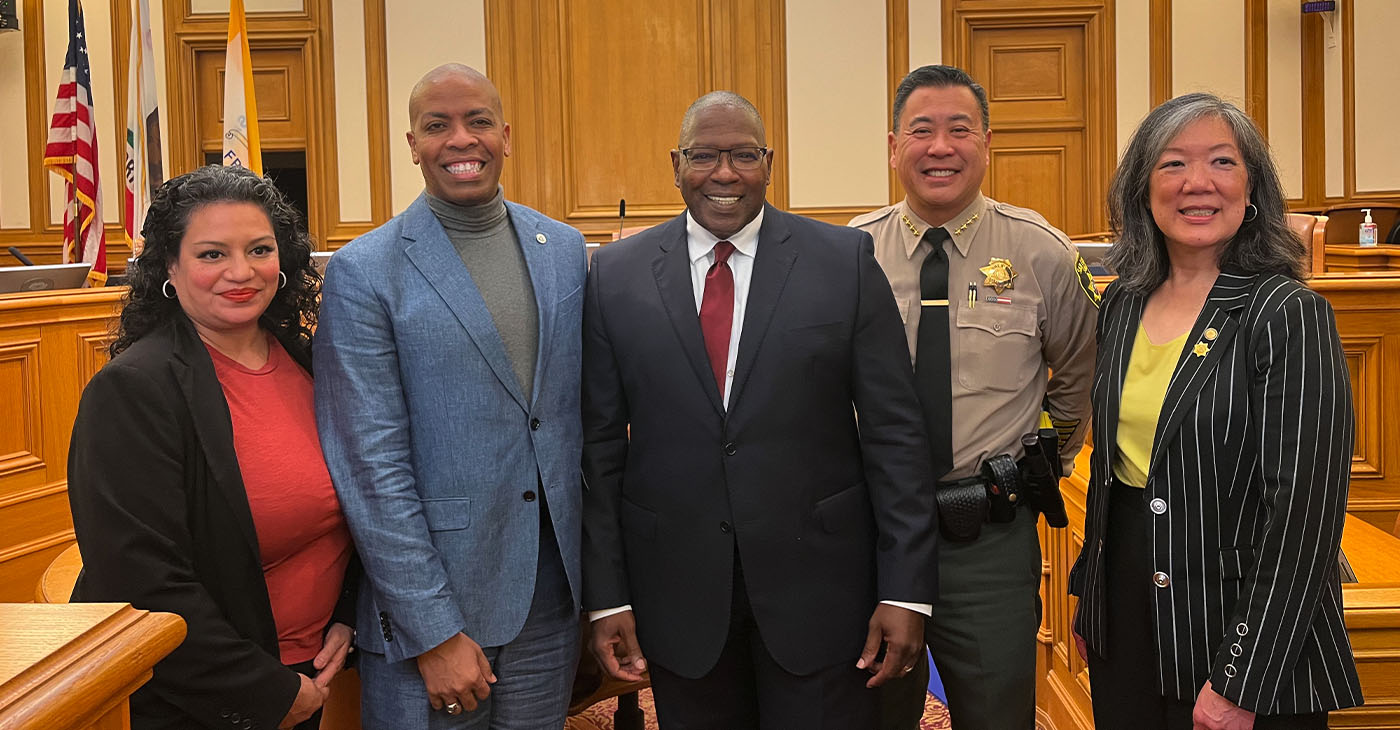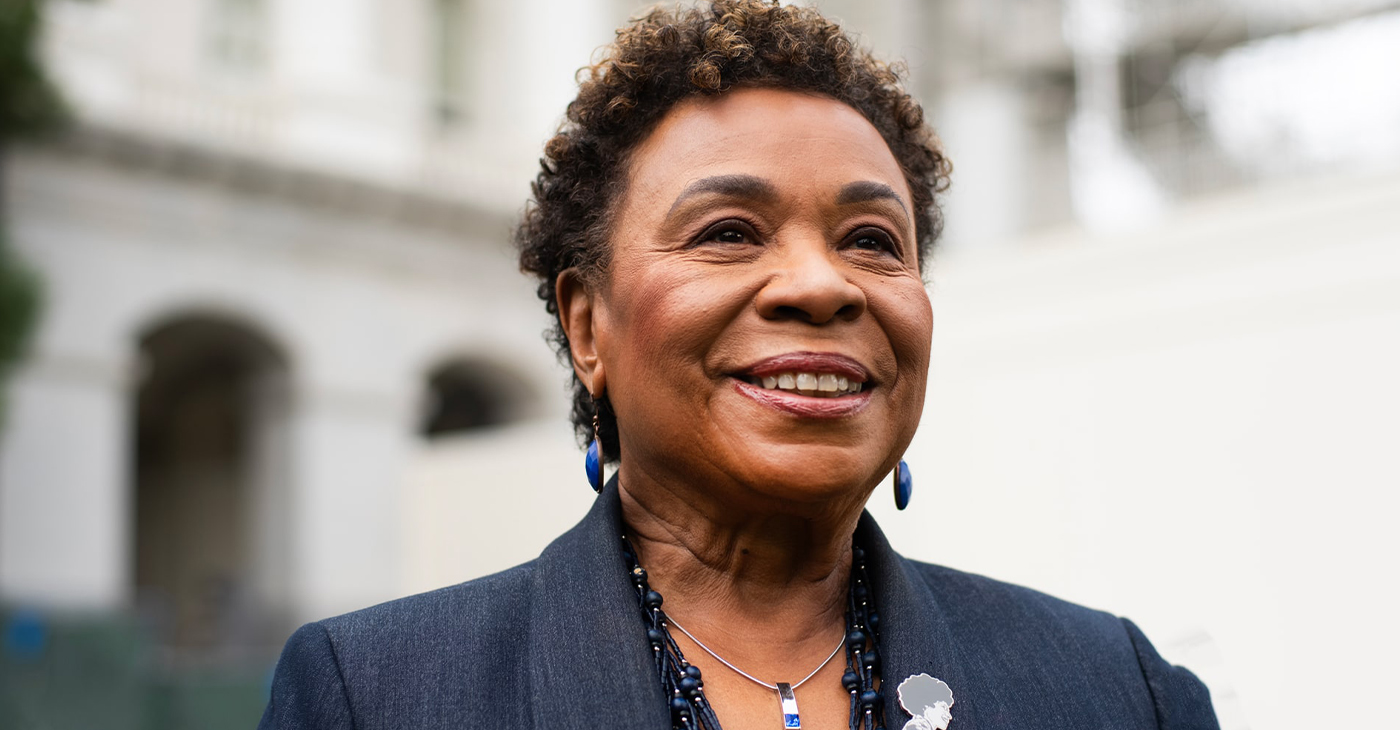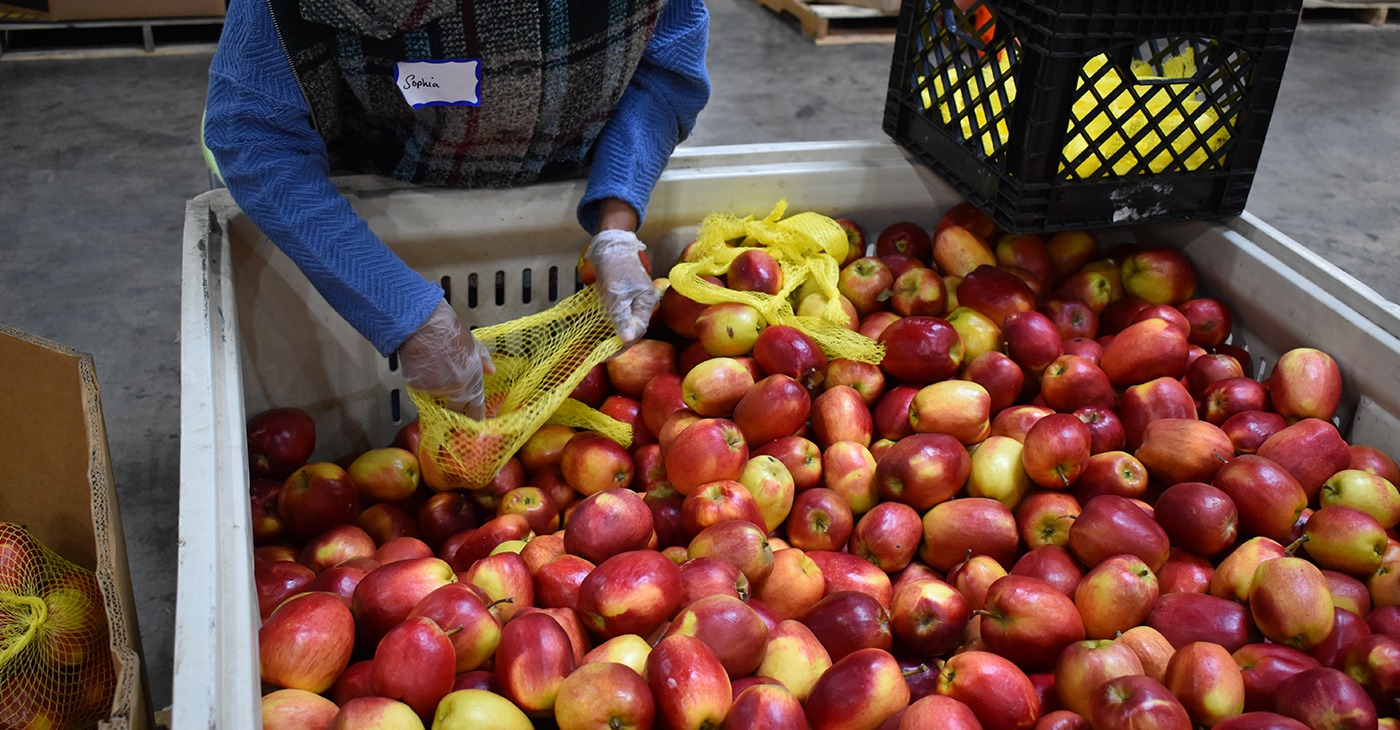Alameda County
Former Alameda County Prosecutor Named Inaugural San Francisco Inspector General
Former Alameda County prosecutor Terry Wiley had a 33-year career in Alameda before stepping into the new inspector general role. He had previously run for Alameda County District Attorney in 2022, but ultimately lost to current DA Pamela Price.

By Magaly Muñoz
Former Alameda County prosecutor Terry Wiley has been named the inaugural San Francisco inspector general who will oversee the city’s sheriff’s department and its two jails.
Wiley was sworn in at city hall on Wednesday morning in a ceremony held by the Sheriff’s Department Oversight Board.
Xochitl Carrion, Vice President of the Oversight Board, explained the year-long recruitment process that extended nationally to find the best fit for the job.
They went out multiple times into the city to ask San Franciscans what they would want to see in an inspector general and how that person could help uplift the city values. Visits to the local jails were also conducted to ask those incarcerated what their living conditions were like and how the inspector could address the issues they were facing in the jails.
“October and November was the grind time for us. It was looking at all these applicants who came nationally and then determining who were the highly qualified, who were the best of the best, and we are lucky that Terry Wiley was in that pile,” Carrion said.
Wiley had a 33-year career in Alameda before stepping into the new inspector general role. He had previously run for Alameda County District Attorney in 2022, but ultimately lost to current DA Pamela Price.
In November 2020, the city voters passed Proposition D, Sheriff’s Department Oversight Board Charter Amendment, which was spearheaded by Supervisor Shamann Walton. The amendment was part of a national movement for justice reform and an effort to end decades of discrimination and unfair treatment within the sheriff’s department.
The Oversight Board was established to advise the Sheriff and the Board of Supervisors regarding the sheriff’s department operations, develop policy recommendations, including a use-of-force policy and comprehensive review process for all use-of-force and critical incidents, investigate the death of any individual in the custody of the Sheriff’s Department, review and investigate any complaints of non-criminal misconduct by employees and contractors of Sheriff’s Department and in-custody deaths, and more.
Wiley will oversee investigations and evaluate the work of the sheriff’s department, as well as checking in on jail conditions.
“It [the work] is going to be invaluable in addressing areas of concern for us and ways that we can improve our job. We want to identify those issues before they escalate, before they become a problem or concern or a lawsuit or anything else,” Sheriff Paul Miyamoto jokingly said to the crowd.
Several speakers during the ceremony spoke to the upstanding character Wiley has shown over his time working as a public servant, saying that he was the right man for the job.
Former Mayor of San Francisco Willie L. Brown spoke to congratulate Wiley and to administer the Oath of Office before he addressed the crowd as the new inspector.
Wiley expressed that the enthusiasm he has for the job knows no bounds and he’s committed to upholding the values that the city has held for so long
“Our office will stand on the pillars of accountability, open transparency, fairness, integrity and honesty. I firmly believe that accountability is the linchpin in maintaining the public’s trust and our criminal justice system and the sheriff’s office,” Wiley said.
He stated that key principles like objectivity, competence and accountability are what will guide the work and decisions made under his leadership. Especially those we have been historically disenfranchised, like people of color, women and the LGBTQ community.
“Our commitment is to create an environment where everyone is treated with the dignity and respect they deserve,” Wiley said.
Activism
Oakland Post Endorses Barbara Lee
Barbara Lee will be able to unify the city around Oakland’s critical budget and financial issues, since she will walk into the mayor’s office with the support of a super majority of seven city council members — enabling her to achieve much-needed consensus on moving Oakland into a successful future.

As we end the celebration of Women’s History Month in Oakland, we endorse Barbara Lee, a woman of demonstrated historical significance. In our opinion, she has the best chance of uniting the city and achieving our needs for affordable housing, public safety, and fiscal accountability.
As a former small business owner, Barbara Lee understands how to apply tools needed to revitalize Oakland’s downtown, uptown, and neighborhood businesses.
Barbara Lee will be able to unify the city around Oakland’s critical budget and financial issues, since she will walk into the mayor’s office with the support of a super majority of seven city council members — enabling her to achieve much-needed consensus on moving Oakland into a successful future.
It is notable that many of those who fought politically on both sides of the recent recall election battles have now laid down their weapons and become brothers and sisters in support of Barbara Lee. The Oakland Post is pleased to join them.
Activism
Oakland’s Most Vulnerable Neighborhoods Are Struggling to Eat and Stay Healthy
For this story, we focused on eight of the 12 ZIP codes in Oakland, those pertaining to East and West Oakland. The ZIP codes include 94601, 94603, 94505, 94606, 94607, 94612, 94619, and 94621. We chose to concentrate on these specific areas, known as the Oakland Flatlands, due to its longstanding history of extremely low-income households and racial inequalities compared to ZIP codes in the Oakland Hills.

These Are the Contributing Factors
By Magaly Muñoz
On a recent trip to the grocery store in West Oakland, single mom Neemaka Tucker contemplated what’s more important to her family’s needs – expensive fresh produce or cheap instant ramen noodles.
“I’m trying to teach my kids to eat healthy, but then my pocket is like, ‘I’m broke’. Getting the processed foods is going to fill you up faster, even though it’s not good for your body,” Tucker said.
Bay Area residents are spending over $100 more a month on groceries than they were pre-pandemic. Those higher costs are straining wallets and forcing families to choose cheap over healthy, possibly contributing to more health problems. These problems are disproportionately affecting people in East and West Oakland, in neighborhoods primarily of low-income families of color.
Oakland residents are experiencing more health problems linked to poor diets, like diabetes, obesity, and heart disease than before the pandemic, particularly in neighborhoods of East and West Oakland, data shows.
“We see a direct relationship between what we eat and medical problems. What we eat affects our weight, our blood pressure and all those things circle back and have an effect on your diseased state,” said Dr. Walter Acuña, a family physician at Oakland Kaiser Medical.
According to data by UCLA Center for Health Policy Research, about 1 in 10 adults in East Oakland neighborhoods experience food insecurity. That’s twice as many people than in most other parts of the city.
Oakland residents’ health concerns are growing
For this story, we focused on eight of the 12 ZIP codes in Oakland, those pertaining to East and West Oakland. The ZIP codes include 94601, 94603, 94505, 94606, 94607, 94612, 94619, and 94621. We chose to concentrate on these specific areas, known as the Oakland Flatlands, due to its longstanding history of extremely low-income households and racial inequalities compared to ZIP codes in the Oakland Hills.
According to UCLA research, about one out of every five adults under 65 in these areas of East Oakland reported poor or fair health. But these problems weren’t isolated to East Oakland. About one in six adults under 65 reported poor or fair health in areas of West Oakland, like the 94607 ZIP codes.
A handful of ZIP codes (94601, 94603, 94605, 94621) in East Oakland also have the poorest health outcomes of any area in the city. Residents there experience the highest rates of obesity and adult diabetes.
UCLA data shows that there has been a two percent increase in the number of adults diagnosed with diabetes in West Oakland (ZIP code 94607) since 2017- 2018. An estimated 11.8% of adults in 94607 in 2021-22 said they had diabetes, whereas 9.8% reported it several years before.
But the problem is more significant, only a few miles away.
In the 94621 neighborhood in East Oakland, an estimated 16.6% of adult residents reported having diabetes in 2021-2022, and the neighboring ZIPs averaged about 15%, according to UCLA data. 2017-2018 data show that only 11% reported a diabetes diagnosis in the 94621, a 5.6% change from recent numbers. The ZIP code estimates are higher than the states’, county’s, and city estimates—11%, 12.4%, and 12.3%, respectively.
Doctors working with Oakland and the larger Alameda County area are seeing an increase in the number of people coming to their offices with chronic health issues in the last few years.
Acuña said he’s frequently treating more and more adults with diabetes and hypertension.
Patients often tell him that it’s easier to afford unhealthy, cheap food than it is to afford the things that are going to make them feel better and stay healthy, he said
Dr. Steven Chen, Chief Medical Officer of Alameda County’s Recipe4Health, said that he’s seeing more kids across the region suffering from obesity, or adults on the brink of developing chronic illnesses, than in previous years.
“Chronic disease is a big epidemic. What’s the root of it? I think food is a big component,” Chen said.
He has seen evidence of improved health when people have access to better food. People with Type 2 diabetes experience a boost in metabolic and sugar management to healthy levels, and those with high blood pressures experience normal numbers.
Recipe4Health is a county-wide program that uses food-based interventions to treat and prevent chronic conditions, address food insecurity, and improve health and racial equity. The program provides up to 12 weeks of groceries for people who are at risk or are experiencing food insecurity.
It’s important for public sectors to have these kinds of investments locally because the results are tangible, he said.
“If our values are that no one gets left behind and that everyone should have an equal opportunity to health and health equity, then we need always to ensure that we are serving those communities that often are left behind,” Chen said.
Experiencing food insecurity in Oakland
Unfortunately, healthy food is becoming increasingly difficult for Oakland residents to access. Over the last five months, The Oakland Post heard from over 50 residents about their struggles finding and affording healthy food. We visited food banks, talked with people at markets and food distribution events, and distributed an online survey.
We learned that residents are travelling to other nearby cities to get cheaper groceries, financial assistance programs like CalFresh are challenging to navigate, wages are low, and food is getting more expensive while the quality appears to be dropping.
Andres, who asked us not to use his last name due to his undocumented status, said he often relies on food distribution from organizations like the Street Level Health Project for his weekly groceries. He wouldn’t be able to eat complete meals otherwise, due to the lack of consistent employment at his car washing job during the winter months.
With eight people living under one roof and only three adults contributing to the household income, he said things are tight.
“During these months, we’re always backed up on paying our bills, including rent, and we’re trying to do more with what little that we have, which is not much,” Andres said.
Andres’ biggest complaint about grocery shopping is the lack of fresh and healthy food that is affordable and good quality. He’s been to food banks and grocery stores where the produce rots within a day or two of receiving it, forcing him to buy fast food in order to feed his family.
Down the street at the Unity Council’s weekly grocery distribution, Mayra Segovia, a single woman in her 50s, said she visits this location almost every week to get food. Her fixed income on Social Security makes it difficult to afford her basic necessities.
Segovia said she receives CalFresh funding to pay for her groceries, but the almost $300 assistance is not enough to get her through the month, so she gets creative. She often does favors for local vendors in exchange for meals. Even with the Social Security checks of a little over $1,000 a month and other resources like subsidized housing, the cost of living is going up. She’s blaming the government for their contribution to the problem.
“We’re not all rich like Donald Trump and all those corrupt politicians, we don’t have that much money like that,” Segovia said.
Social service assistance is falling short
Several people we spoke with said financial food assistance like CalFresh isn’t supplementing the gaps in their budgets.
Neemaka Tucker, mom of two elementary-aged kids, said she receives $123 a month from CalFresh, yet she’s spending almost $600 on groceries at the store. She feels like she should be getting more assistance, especially considering her lower, single income. “I’m appreciative [of the CalFresh funds] that I get anything because every little bit helps, but it’s still not enough for my family,” Tucker said.
A lack of grocery store options in West Oakland has also made it even harder to get food on the table, Tucker said.
There are more convenience stores than grocery stores within walking distance to her home on the northeast side of West Oakland, and the prices seem to be exacerbated because of their limited food stock, Tucker said. A gallon of milk at the store could run her up to $3.80, but at the local convenience market, it’s nearly $6.
“I just find that the majority of the money that I’m spending is on the travel to get the food, then on the food itself,” Tucker said.
Healthy groceries are a necessity to manage Tucker’s health. She is diabetic and has high blood pressure, so eating and buying fresh produce is important because keeping her symptoms at bay is a must for her health. It’s been difficult to get what she needs for her body to maintain her chronic health problems because she often battles with lack of affordability of what she’s buying, she said.
“I find myself trying to figure out what’s healthy for each person and then have enough of it so we all can [eat well],” Tucker said. “Back in the day, bread and potatoes used to be staples to get your kids full, but food like that makes me sick because that’s too much [carbohydrates] since I have diabetes.”
Both her kids are athletes who also need healthy food. She’s finding that even though her kids don’t eat meat, which tends to be expensive, she’s still spending more than she’d like to on fruit and vegetables.
In Oakland, the local investment is low
In the last year, the city has cut grants to nonprofits like Meals on Wheels, which serves 3,000 hungry seniors, and Street Level Health Project, which provides groceries and meals to undocumented day laborers. Tax measures, like the Sugar-Sweetened Beverage Tax, were intended to help decrease the food and health crisis but are also not being managed in the way Oakland residents voted for, according to community leaders and advisory board members. The majority of the tax money is going towards funding city agencies.
The Oakland Post contacted city and county officials several times for comment but did not get a response.
Across the Bay Area, San Francisco is investing millions to address food insecurity through a pilot program that establishes free grocery stores in food desert districts. Shoppers of the pilot market said they have seen a positive change to the way they feed their families and how much they’re able to save every month.
Oakland resident PC, who chose to use an abbreviated version of his name to protect his privacy, said he’d be interested in seeing a market like the one in San Francisco because it would alleviate the tight budget he has for himself.
PC said he’s had some unpleasant experiences with food distribution workers being rude to residents waiting for grocery bags. “The line is already long as it is and can sometimes feel shameful when you’re going through hard times,” PC said, so an option to get free food in a setting that resembles a market would be ideal.
The garden lead for West Oakland’s People’s Programs, ab banks, helps deliver fresh produce from a local garden to households in the projects, because the need for healthier options has been particularly high in recent years, they said.
People’s Program serves around 170 people in the 94607 area with groceries, along with a mobile health clinic and free breakfast program. Their goal is to serve a community that already deals with its own set of disadvantages, and looks to show people that not everything needs to contribute to a bigger gain and people have the right to use the local land to grow the food they need.
Banks said they see firsthand what the lack of investment in West Oakland has done to folks: homelessness, priced out living situations, environmental racism, and lack of food access.
They explained that although they feel a duty and a calling to the work at People’s Program to help an underserved neighborhood, they questioned how the city is pouring millions of dollars towards finding solutions to Oakland’s biggest problems but no significant change has happened yet. banks said there are basic necessities that should be birthrights and not restricted to what the government thinks people need.
“[The investment] is not enough. There’s no access to fair housing, not enough access to food, not enough access to healthcare. But that’s just not specific to Oakland, that’s a United States problem,” banks said.
Reporter Magaly Muñoz produced this story as part of a series as a 2024 USC Annenberg Center for Health Journalism Data Fellow and Engagement Grantee.
Alameda County
Trump Order Slashes Federal Agencies Supporting Minority Business and Neighborhood Development
The latest executive order targeted several federal agencies, including the Minority Business Development Agency (MBDA) and the Community Development Financial Institutions Fund, ordering that their programs and staff be reduced “to the minimum presence and function required by law.” The executive order targeted more agencies that Trump “has determined are unnecessary,” the order stated.

By Brandon Patterson
On March 14, President Trump signed an executive order slashing the operations of two federal agencies supporting growth in minority business and neighborhoods as he continued his attacks on programs supporting people of color and on the size of the federal bureaucracy.
The latest executive order targeted several federal agencies, including the Minority Business Development Agency (MBDA) and the Community Development Financial Institutions Fund, ordering that their programs and staff be reduced “to the minimum presence and function required by law.” The executive order targeted more agencies that Trump “has determined are unnecessary,” the order stated.
The MBDA’s mission is to “promote the growth and global competitiveness” of minority business enterprises, or MBEs. In 2023, according to its website, the agency helped MBEs access $1.5 billion in capital and facilitated nearly $3.8 billion in contracts awarded to minority business enterprises. It also helped MBEs create or sustain more than 19,000 jobs nationwide. Similarly, the CDFI Fund supports economic growth in under-invested communities by providing funding and technical assistance to local CDFIs, including banks, loan funds, and credit unions, that support community development projects in cities across the country. In 2023, the fund supported more than 1,400 local CDFIs across the country, including more than 80 in California — among the highest number for any state in the country.
The MBDA has local satellite business centers operated by organizations that support minority clients with services such as business consulting, contract bid preparation, loan packaging, and accessing capital funding. The San Francisco Bay Area business center is San Jose, operated by San Francisco-based organization Asian, Inc. Meanwhile, local Oakland CDFIs supported by the federal CDFI fund since 2021 include Habitat Community Capital, TMC Community Capital, Gateway Bank Federal Savings Bank, Beneficial State Bancorp, Inc., and Main Street Launch.
“It is clear that the hollowing out of the CDFI Fund and MBDA is not being ordered because those programs have failed in their mission,” the CEO of Small Business Majority John Arensmeyer, a national organization that advocates for small businesses, said in a statement on Saturday. “Instead, it is yet another case of President Trump using DEI as a club to eviscerate programs that seek to level our economic playing field.”
Congresswoman Lateefah Simon also slammed the decision in a statement to the Oakland Post. “As a member of the House Small Business Committee who represents multiple CDFIs in CA-12, I believe Trump’s gutting of operations at the Minority Business Development Agency and at the Community Development Financial Institutions Fund is a direct attack on small businesses, communities of color and other underserved communities,” Rep. Simon said. “Both the MBDA and the CDFI Fund were created with bipartisan support to help historically underserved communities and small businesses — and both programs have helped to dramatically change the material realities of people and bolster entrepreneurship in the U.S. There is no logic to this decision. The point is discrimination and cruelty.”
-

 Activism2 weeks ago
Activism2 weeks agoWe Fought on Opposite Sides of the Sheng Thao Recall. Here’s Why We’re Uniting Behind Barbara Lee for Oakland Mayor
-

 #NNPA BlackPress3 weeks ago
#NNPA BlackPress3 weeks agoRev. Dr. Jamal Bryant’s Black Church Target Boycott Mobilizes 150,000
-

 Activism3 weeks ago
Activism3 weeks agoSan Francisco Is Investing Millions to Address Food Insecurity. Is Oakland Doing the Same?
-

 #NNPA BlackPress3 weeks ago
#NNPA BlackPress3 weeks agoRecently Approved Budget Plan Favors Wealthy, Slashes Aid to Low-Income Americans
-

 Activism2 weeks ago
Activism2 weeks agoFaith Leaders Back Barbara Lee for Mayor, Criticize Candidate Loren Taylor for Dishonest Campaigning
-

 Activism3 weeks ago
Activism3 weeks agoOakland Post: Week of March 12 – 18, 2025
-

 Activism2 weeks ago
Activism2 weeks agoGroup Takes First Steps to Recall District Attorney Diana Becton
-

 #NNPA BlackPress3 weeks ago
#NNPA BlackPress3 weeks agoPRESS ROOM: The Urban One Podcast Network Announces Los Angeles Wildfires Podcast, ‘Altadena: After the Fire’





















































